Some commentators felt that the appearance of Benjamin Netanyahu was an embarrassing exception to the many successes of the recently concluded Summit for Democracy. We disagree. To be sure, Netanyahu’s remarks in praise of democracy were disingenuous given his recent behavior. But his appearance was a vivid reminder of the connection between corruption and democratic backsliding — two things of which Netanyahu stands accused. Moreover, it also reminded us of the massive protests that have greeted his assault on democracy, and so, of another important point: the central role of ordinary people in safeguarding that political system.
Behind the enormous demonstrations that have roiled Israel in recent weeks are Netanyahu’s corruption problems and his proposed response — which threatens the foundations of Israeli democracy. In February, Netanyahu’s right-wing coalition government voted to press ahead with important elements of its contested plan to gut the authority of Israel’s judiciary. The timing of Netanyahu’s sudden change of heart on the importance of “a strong, independent court” is more than a mere coincidence.
Netanyahu’s newfound impetus to weaken Israel’s judiciary arose after he became embroiled in a criminal trial for multiple corruption charges: bribery, fraud, and breach of trust. The accusations stem from three separate cases in which Netanyahu is accused of granting political favors in exchange for luxury gifts or favorable news coverage. Netanyahu has pleaded not guilty, denied all wrongdoing, and insisted that the proposed judicial reforms are unrelated to his corruption trial. But many commentators have highlighted how Netanyahu could use the reforms to extricate himself from legal challenges.
Even before his indictment, Netanyahu sought to delegitimize the investigations, calling them a “witch hunt” orchestrated by the media and leftist conspirators seeking to remove him from office through undemocratic means. Here, it is worth noting that both the police chief who investigated the cases and the attorney general who indicted Netanyahu were appointed by Netanyahu himself. The ongoing corruption trial against Netanyahu has lasted over three years, and there is no end in sight. The case has been delayed multiple times, and the Jerusalem District Court is still in the process of surveying a list of over 300 witnesses. If convicted, Netanyahu could be sentenced to multiple years in prison.
As a defendant, Netanyahu has made multiple attempts to evade the charges, including filing motions to delay the trial, to dismiss the most serious charges, and to dismiss the trial entirely. In January 2022, he pursued a plea deal before reversing course. After winning a dramatic reelection bid, Netanyahu has demonstrated his willingness to save himself no matter the cost — even if it means dismantling his country’s democracy.
Since forming a coalition, Israel’s right-wing government has advanced a slew of legal and judicial reforms driven at least in part by a desire to protect Netanyahu from criminal prosecution. For example, he had been barred from personally leading and negotiating reforms potentially affecting his corruption case because of his conflict of interest. But last month, he and his allies in the Knesset, the Israeli parliament, approved a law removing the main sanction for not complying with this ruling. Netanyahu’s allies have expressed their desire to go further and pass the so-called “French Law,” which would immunize sitting prime ministers from criminal prosecution for the duration of their tenure and abolish the “fraud and breach of trust” offense from Israel’s penal code altogether.
Of the pending actions, the most threatening is the package of bills that among other proposals would give the Knesset an outsized role in the selection of judges, grant the Knesset the power to override the Supreme Court, and limit the court’s right to exercise judicial review in the first place. Netanyahu and other proponents have couched the judicial reforms as an innocuous attempt to check a leftist and overly activist judiciary. But make no mistake. The proposed reforms represent the most severe attack against democracy in Israel’s history. If they were to pass, the Supreme Court would be stripped of judicial review power, and Israel would lose its only independent check on executive and legislative power. A simple majority of lawmakers in Israel’s unicameral legislature could override Supreme Court decisions and pass any law — even laws that threaten individual or minority rights — with nearly total impunity.
This situation is a vivid example of the connection between corruption and democratic backsliding. When the world’s democracies convened for the second Summit for Democracy, we were again reminded that one of the central dimensions of the fight for democracy is the fight against corruption. In some cases, such as Israel’s Netanyahu and India’s Narendra Modi, leaders of countries that have suffered backsliding attended the summit. In other cases, such as Hungary’s Viktor Orbán and Turkey’s Recep Tayyip Erdoğan, they did not. However, each of these leaders has made similar efforts to co-opt judicial institutions and exploit or change the rules of the game for their own private advantage, which have catalyzed their country’s degeneration from a democracy to an authoritarian or mixed regime.
Returning to Israel, the connection between corruption and autocracy is hardly lost on the Israeli public. Since its inception, the proposed judicial overhaul has been met with ubiquitous and impassioned criticism. Ironically, although proponents present the reforms as a way to defend majoritarianism, a larger share of Israelis opposes the reforms than supports them. Only a minority (31%) of the public approves of the reforms. By contrast, a hefty majority (66%) believes the Supreme Court should have the power to strike down laws and that the current method for selecting judges should remain in place (63%).
After warnings of an economic downturn, threats from army reservists, paralyzing nationwide strikes, and what organizers claim to be the largest protests in Israeli history, Netanyahu (finally) paused the judicial overhaul. The intensified level of civic action was a response to Netanyahu’s firing of his defense minister, Yoav Gallant, for his opposition to the proposed reforms. The controversial dismissal signaled a commitment to pass the judicial overhaul despite popular opposition and dissent within the government.
Though Netanyahu’s announcement of the pause was met with cheers, many Israelis are skeptical of Netanyahu’s calls for compromise and believe the pause of the judicial reforms to be nothing more than a tactical delay — an underhanded attempt to bide his time before forcing the reforms through. In Netanyahu’s words, the pause is intended “to prevent the nation from being torn apart” and permit negotiation with the opposition, but it is unclear if a compromise can be achieved. In the same announcement, Netanyahu defiantly emphasized that the pause does not represent political surrender. He declared: “Our way is right. We will not give up the path for which we were chosen.”
Be that as it may, this course of events reminds us of a second critical principle: The defense of a democracy ultimately lies in the hands of its people, whether it be through rejecting authoritarian-leaning leaders at the ballot box or protesting in defense of free and fair elections (like in Ukraine’s Orange Revolution). The fact that Netanyahu was forced to put the reforms on hold exhibits this power yet again. To be sure, he may resume his push forward, but so will the Israeli people. Indeed, protests have continued.
That brings us to the democracy summit. Two days after the announcement, Netanyahu spoke at the Summit for Democracy and responded to the fierce opposition facing the judicial overhaul. He defended the fortitude of Israeli democracy, attesting “Israel was, is and it will always remain a proud, strong and vibrant democracy, as a beacon of liberty and shared prosperity in the heart of the Middle East.” Netanyahu’s statement, which attempted to placate protesters and reassure foreign critics including President Joe Biden, falls short. Netanyahu did not back down from his support of the judicial overhaul in his summit remarks. He continued to advance the right-wing coalition’s argument on the need to contain an overly activist judiciary.
At the same time, his remarks offered a silver lining, because his appearance focused additional global attention on the link he exemplifies between corruption and autocracy, or alternatively, anti-corruption and pro-democracy efforts. And it also inevitably concentrated the eyes of the world upon those hundreds of thousands of Israelis who marched in defense of their nation’s political values. Indeed, it was as if they were all on-screen with him given the context in which his remarks were covered.
At Brookings, our research focuses on both of these issues, among many others. In publications like the “Democracy Playbook,” we have presented data proving the importance of judicial independence and rule of law as a bulwark against democratic backsliding. And in our latest Brookings signature anti-corruption initiative, Anti-Corruption, Democracy, and Security (ACDS), we will continue to research and analyze this nexus in various contexts — in prominent and well-established democracies like Israel but also in newer war-torn democracies like Ukraine.
Success can be measured in many ways, including backhanded ones. Netanyahu may not have wished it, but his appearance at the Summit for Democracy highlighted how corruption drives democratic backsliding and also mobilizes concerned citizens to speak out to protect democratic values. Intended or not, that was a success indeed.
The views in this commentary are solely those of the authors. Brookings scholars co-lead the Summit for Democracy’s Financial Transparency and Integrity cohort, which studies the connection between fighting corruption and protecting democracy.
-
Acknowledgements and disclosures
The authors wish to thank Abigail Keaney for fact-checking this commentary.
The Brookings Institution is committed to quality, independence, and impact.
We are supported by a diverse array of funders. In line with our values and policies, each Brookings publication represents the sole views of its author(s).

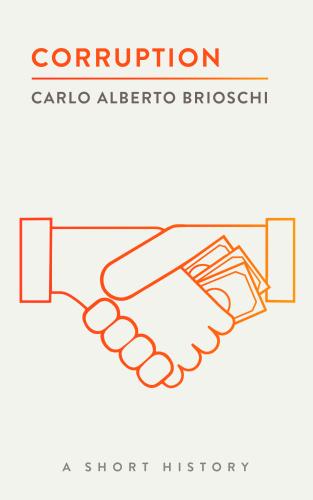

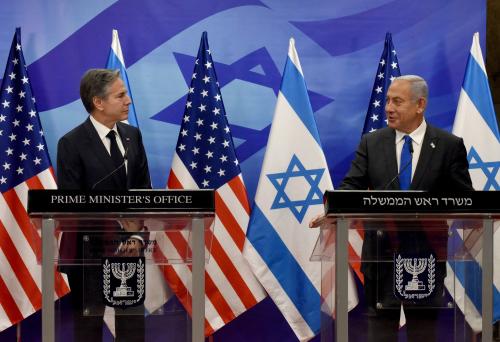



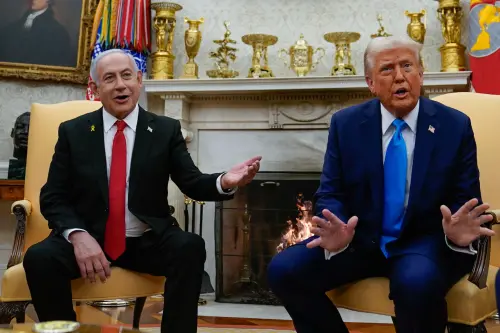
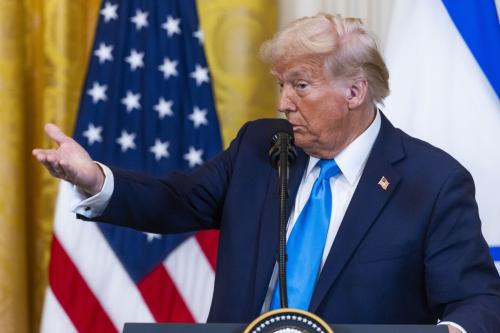
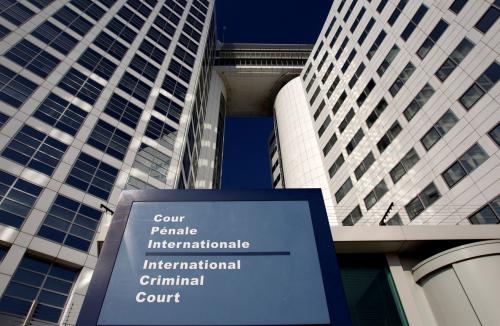
Commentary
The corruption and autocracy nexus: The case of “King Bibi”
April 10, 2023